Jacob, the Liar (Jakob, der lugner, 1975) is one of the best acted & most moving tales of the Holocaust I've seen. A tragi-comedy, the besieged Warsaw ghetto is being emptied out section by section, & there is no chance for anyone's survival.
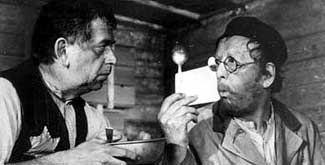 Filmed in what was at the time East Germany, set in Poland, Jakob, der Lugner looks at an issue that West Germany of the 1970s was inclined to ignore. It's a subtle film in many ways & some have faulted it for not showing sufficient deprivation. Filmed in what was at the time East Germany, set in Poland, Jakob, der Lugner looks at an issue that West Germany of the 1970s was inclined to ignore. It's a subtle film in many ways & some have faulted it for not showing sufficient deprivation.
But what I saw was a film in which an old man's sensual appreciation of a mere slice of bread, or a young man's plan of a suicide-run to snatch a few random potatoes, telling so much more than could scenes of beatings or tortures. It's a film that invites us to look inside the spirits of the characters, & places their tormentors somewhat distant -- outside the ghetto walls -- so that we are not side-tracked by the horrific glamours of evil.
Into this bleak world Jacob Heym (Vlastimil Brodsky) accidentally interjects hope by pretending to have a radio secreted away, sharing invented news from the greater world beyond Poland & Germany. His initial purpose is to stop a young man from a bold but surely suicidal act. The lie very soon gets away from him, & grows.
The good news, according to Jakob, is that the Red Army is defeating the Nazis & will arrive as liberators very soon. As this lie spreads, & furtive misinformed faces lean toward him for whispered daily updates, Jakob discovers that he alone is without hope, for he is the only man who knows the good news is fabricated.
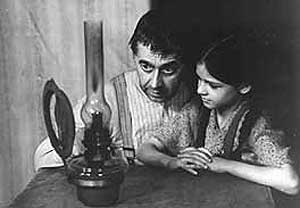 He eventually breaks down & tells his best friend (Erwin Geschonneck) the truth, & the repurcussions are so devastating that Jacob knows he must keep up his pretense to the bitter end. He eventually breaks down & tells his best friend (Erwin Geschonneck) the truth, & the repurcussions are so devastating that Jacob knows he must keep up his pretense to the bitter end.
There's a beautiful sequence in which Jakob sets up a kerosene lantern as his radio to present a radio show to a little niece (Manuela Simon), an innocent girl who loves her uncle dearly.
Even though, unknown to Jakob, she has "looked behind the curtain," she is young enough that there is no distinction for her between fantasy & reality.
To her, the Nazi overseer whose mansion on a hill top is visible from the ghetto is actually a castle where lives a valiant prince who will ride in to save the day. And when she, too, is loaded into a train car, she peers through the slats at that fading "castle," still full to the brim with belief in goodwill & heroes.
Two awful films failed to capture the humor & sadness in the tastefully acceptible balance that Jakob, der Lugner so perfectly maintainted. One was Roberto Benigni's egoistic Oscar-winning upbeat view of the Holocaust, Life is Beautiful (La Vite e Bella, 1997) in which death camp life is just an excuse for happy schtick.
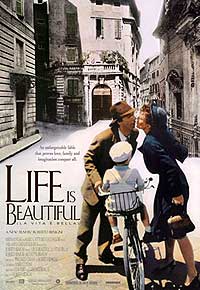 A Jewish waiter encourages his son (Giorgio Cantarini) in the camp to live in a fantasy world similar to that of the little girl of Jakob, der Lugner. But since the only character that matters is clowning Roberto's own, the poignancy is dishonest, being only a plundering of the child's experience to upraise the character of the adult. A Jewish waiter encourages his son (Giorgio Cantarini) in the camp to live in a fantasy world similar to that of the little girl of Jakob, der Lugner. But since the only character that matters is clowning Roberto's own, the poignancy is dishonest, being only a plundering of the child's experience to upraise the character of the adult.
As star, director, & co-author, Benigni was able to insure for himself that no one else is permitted to shine. It's the ultimate mug-fest, with so little reality impinging on the joyful internment that there is no irony, no depth of meaning, there is only the star's self-important vaudeville show.
Jakob, der Lugner was able to get away with a bit of "distancing" of the horrors because it was set inside ghetto walls, but Benigni moves the whimsy & action of Life is Beautiful to a death camp per se, & still manages to imagine all pleasantries sustained.
It was not done with irony because life in the death camp really is portrayed as beautiful. I found the dishonesty or ignorance well outside the capacity to entertain me, yet enough people were susceptible to a "feel good movie!" about the anihilation of Jews that it was a commercial & critical success around the globe.
It's a story of the Holocaust that will not frighten or worry & certainly not educate eight year olds, as it really is the circusy version void of authentic pain, as though Bozo the Clown were walking through a thistlefield pretending it was Hell whenever getting his sleeve caught on a thorn or his finger stuck in a bottle.
In the film's defense many have posited their adoring belief that it is not a film about the Holocaust but about optimism. If that were so, it shouldn't have been set in a death camp. The film's first act indeed seems somewhat realistic in its context of fascism & antisemitism in Italy.
A fairy tale romance in such a dark context is credible enough, if you can believe an ugly man without prospects can win the beautiful girl (Nicoletta Braschi) by being essentially an irritating stalker. You also have to overlook the legal fact that in Mussolini's Italy, the marriage between a Jewish man & non-Jewish woman was banned.
It's only when the Holocaust itself is evoked does Benigni's "all things are good" brush against "even the Holocaust is good" so long as one clown transcends destruction. And a child with such a father is guaranteed to experience the Holocaust as a happy time of life, completely untouched by anything with historical validity to it.
The contrivances for this new myth of a Happy Holocaust requires not only that the clown be an amazing liar, but that the audience be eager to be deceived, willingly misinformed that the Holocaust was nothing but a bad dream, not something that ever happened, so it's a cinch to cajole a child out of his tears.
In Hollywood westerns, Indians are frequently nameless & distant figures who get shot off horses, mere backdrop decorations for the white hero, but if looked at momentarily may be rather romanticized. Uber-goy Benigni pretending to be a happy-go-lucky Jew in a death camp similarly uses nameless doomed Jews in the background as decorations for his one-man-show style of performance.
As point of fact, nowhere in the film's dialogue is it clearly stated that Guido is a Jew, Benigni's one concession to reality which admits to the misappropriation of someone else's biography. Like a tale of Japan told through the white character played by Richard Chamberlain or Tom Cruise; like a tale of China with the main Chinese woman played by Katherine Hepburn; like a tale of the Dakota Indians told through the only white character played by Kevin Costner, Benigni had to leave open the possibility that he was not Jewish at all, as authenticity does not appeal to the primary target audience which was decidedly not Jewish but on its native ground more on the order of Catholic.
And we're asked to believe that suffering is merely a matter of perspective. If a nice dad tells his son they're in a role playing game & whoever can go hungry longest wins, then starvation is pleasurable rather than injurious. Nothing whatsoever about the Holocaust need be the least bit scary or numbing because everyone at least has their health.
I was reminded of a cartoon by Gahan Wilson in which Hitler wears a smile-face mask. Benigni somehow thought that if he could be that smiley face, that'd be a good thing. This film deserved only a sound thrashing, not awards everywhere from Cannes to the Academy.
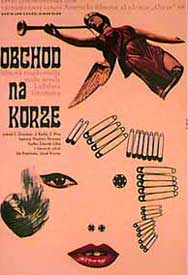 None of which is to say the Holocaust is hands-off for humor. But it takes a level of honesty & sensitivity an ego-driven clown lacked. The Czeck film Obchod no korze (The Shop on Main Street, 1965) would be an example in addition to Jakob, der Lugner of sensitive humor in the midst of horror. None of which is to say the Holocaust is hands-off for humor. But it takes a level of honesty & sensitivity an ego-driven clown lacked. The Czeck film Obchod no korze (The Shop on Main Street, 1965) would be an example in addition to Jakob, der Lugner of sensitive humor in the midst of horror.
Shop didn't have to deny the truth to find its points of humor, & its "hero" (Josef Kroner) was an essentially frightened creature whose cowardice in the face of horrors is not hard to understand. That he was not instinctually heroic makes his eventual discovery of his own dignity righteous & moving as nothing is in Life is Beautiful.
It might've been pallatable as a satire against fascism in Italy, which that nation rarely confronts head on. Benigni's ego, in attempting to embrace the Jewish experience as an excuse for a goy clown, demanded a bigger history than was his to make light of, & could not settle for the fascist setting of Italy itself.
In our age when Holocaust deniers & antisemitism is again on the rise, it goes down easy for all too many to represent the death camps as not really all that bad; certainly nobody got stick-thin from starvation; families could at least be reuinited; slave labor was tiring but not too much so; a clever man could come & go pretty much as he pleased; & most obviously there weren't bodies stacked up like cordwood the way they appear to be in actual contemporary footage.
When Benigni was confronted on creating a Disney World version of a death camp, he was shameless; the truth wouldn't have been funny, so he lied.
Was it on some level brave to use the Holocaust for an otherwise commercial MacMovie Comedy? Apparently not, given the money & awards gained by making his smiley faces out of the ashes of dead Jews. That others find Life is Beautiful as much fun as a trip to Disneyland doesn't make it forgiveable.
America seems to have re-thought their transient love affair with Benigni's slapstick comedy. After lauding this decidedly unlaudable film, no other Benigni film has ever attracted an audience to American theaters. Could it be that on reflection, laughing at the Final Solution didn't make viewers as pleased with themselves as they were at first?
Someone not quite so narcissistic as Benigni might have managed it without coming off as Ronald MacDonald or the Devil's good pal Vanity gigglingly convinced he can wring plenty of laughs from the extermination of Jews. Perhaps in his next time he'll play a black man shuckin' & jivin' as the happy-go-lucky house slave in the ante bellum south, who gets sold to another plantation but is happy because it reunites him with his son, & the two of them are such jolly happy upbeat slaves because they're always playing Dungeons & Dragons.
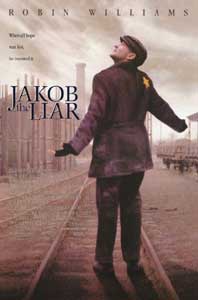 The remaining film to try & fail is more surprising still because it attempts to be a true-to-the-original, & that's the English language remake of Jakob, der Lugner, the Robin Williams vehicle Jakob the Liar (1999), which takes the poetic original & reduces it to a mawkish fraud. It's not as spiritually demaning as Benigni's circus act in a death camp, but it's lame.
The remaining film to try & fail is more surprising still because it attempts to be a true-to-the-original, & that's the English language remake of Jakob, der Lugner, the Robin Williams vehicle Jakob the Liar (1999), which takes the poetic original & reduces it to a mawkish fraud. It's not as spiritually demaning as Benigni's circus act in a death camp, but it's lame.
Perhaps the phoniness stems from the mere fact of being in English, but I think it goes deeper. As played by Williams, Jakob is such a fraudulant character.
The predictability of the plot is not overcome as it is in the German original. Instead, every piece of humor is overstated as though performed by a stand-up comic performing to the peanut gallery.
Every moment of sorrow is telegraphed as though a guy in enormous shoes in running into the picture with signs informing us "Prepare to laugh!" or "Prepare to feel sad!"
Similiar to Roberto Benigini, Robin Williams either would not or could not subdue his own presence. The story plays off a piece of history well known to all but the most callow & ignorant, so the fate of these characters is no surprise, & should not be the point of the climax. But this remake peters out into a formula-ridden exhibition of the star's acting.
The German original let each performer shine in turn, until by the end the gaze in a little girl's eyes is all that is needed to break one's heart. In the remake, only Jakob matters, not from vanity as in Life is Beautiful, but it's a problem.
Robin as Jakob looks so tidy in a nice pork-pie cap, it almost seems like he forgot to dress poor for the role. The profound expressiveness of Vlastimil Brodsky's face is not to be found in Robin's (or Begnini's) mere mugging, & while Vlastimil in costume seemed to have lived & suffered in those clothes, Robin seems always to have just stepped refreshed from the costume department.
American movies are just not permitted to be enigmatic, calm, or profound. The subtleties that made this script such a moving experience in the German original have been redacted to the physical elements in the American remake. Frank Beyer's actors for the 1975 film better understood that it is what's inside the characters that must be felt, not how expansive one's body language can be. A profound film was remade with just enough alteration of mood & content to become a trivial film.
copyright © by Paghat the Ratgirl
|
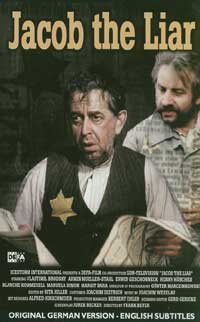
 Filmed in what was at the time East Germany, set in Poland, Jakob, der Lugner looks at an issue that West Germany of the 1970s was inclined to ignore. It's a subtle film in many ways & some have faulted it for not showing sufficient deprivation.
Filmed in what was at the time East Germany, set in Poland, Jakob, der Lugner looks at an issue that West Germany of the 1970s was inclined to ignore. It's a subtle film in many ways & some have faulted it for not showing sufficient deprivation. He eventually breaks down & tells his best friend (Erwin Geschonneck) the truth, & the repurcussions are so devastating that Jacob knows he must keep up his pretense to the bitter end.
He eventually breaks down & tells his best friend (Erwin Geschonneck) the truth, & the repurcussions are so devastating that Jacob knows he must keep up his pretense to the bitter end. A Jewish waiter encourages his son (Giorgio Cantarini) in the camp to live in a fantasy world similar to that of the little girl of Jakob, der Lugner. But since the only character that matters is clowning Roberto's own, the poignancy is dishonest, being only a plundering of the child's experience to upraise the character of the adult.
A Jewish waiter encourages his son (Giorgio Cantarini) in the camp to live in a fantasy world similar to that of the little girl of Jakob, der Lugner. But since the only character that matters is clowning Roberto's own, the poignancy is dishonest, being only a plundering of the child's experience to upraise the character of the adult. None of which is to say the Holocaust is hands-off for humor. But it takes a level of honesty & sensitivity an ego-driven clown lacked. The Czeck film Obchod no korze (The Shop on Main Street, 1965) would be an example in addition to Jakob, der Lugner of sensitive humor in the midst of horror.
None of which is to say the Holocaust is hands-off for humor. But it takes a level of honesty & sensitivity an ego-driven clown lacked. The Czeck film Obchod no korze (The Shop on Main Street, 1965) would be an example in addition to Jakob, der Lugner of sensitive humor in the midst of horror.